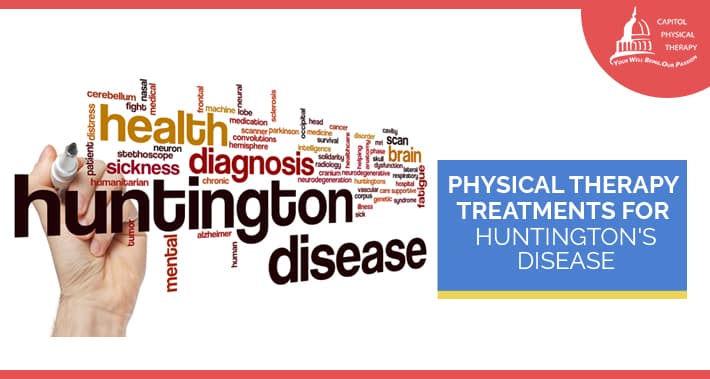
It’s not easy being diagnosed with a degenerative disease.
Huntington’s disease can be very distressing for both patients and their loved ones, since it’s a neuropsychiatric illness, meaning that physical symptoms and mental symptoms are involved.
There is currently no known cure for Huntington’s disease.
However, a neurological physical therapist can help you manage your condition and help you improve your quality of life.
If you or your loved one have been diagnosed with this condition, please keep reading to find out how our DC physical therapists can help.
What Is Huntington’s Disease?
Huntington’s disease is a rare, hereditary condition that damages your brain cells.
This condition affects about seven out of every hundred thousand people, and is more common in those of European descent.
Also, a child of a parent with Huntington’s disease has a 50% chance of inheriting it.
Huntington’s disease is characterized by affecting physical movements, mental health, and cognitive abilities, but these symptoms usually start between the ages of thirty and forty.
However, they can also happen during childhood or adolescence (less commonly), but there are ways to manage this disease and deal with its symptoms.
Symptoms Of Adult Onset Huntington’s Disease
As mentioned previously, the symptoms of Huntington’s disease usually start between thirty and forty years old.
Early signs of this condition include:
- Poor coordination
- Depression
- Hallucinations
- Irritability
- Involuntary movements
- Psychosis
- Difficulty making decisions
- Difficulty processing new information
As this type of Huntington’s disease progresses new symptoms may appear, such as:
- Difficulty walking
- Uncontrolled twitching movements (chorea)
- Confusion
- Memory loss
- Personality changes
- Trouble swallowing and speaking
- Decline in cognitive abilities
- Speech changes
Keep in mind that the severity of these symptoms may also depend on the unique genetic situation of each person.
Symptoms Of Early Onset Huntington’s Disease
This type of Huntington’s disease is not very common, and symptoms start to show up during childhood and adolescence.
Early onset Huntington’s disease is characterized by causing emotional, mental, and physical symptoms, such as:
- Drooling
- Frequent falling
- Clumsiness
- Rigid muscles
- Slurred speech
- Slow movements
- Seizures
- Sudden decline in school performance
Huntington’s Disease Causes
The cause of Huntington’s disease is a defect in a single gene, and having only one copy of this gene can trigger this condition.
As explained previously, if one of your parents has this gene, you have a 50% chance of having it as well and pass it down.
However, the mutation with Huntington’s disease is different than most other genetic disorders.
With many other disorders, there’s either a missing section of a gene, or a substitution.
But with Huntington’s disease, there’s a copying error.
An area within the gene was copied too many times.
These copying errors tend to become greater with each generation, meaning that if you have Huntington’s disease as a result of a parent with the disease, your symptoms are likely to be more severe.
If you’re worried about the possibility of having Huntington’s disease, seek advice from a healthcare provider, since they can run a variety of tests to confirm this condition.
The kinds of tests you can expect include:
- Brain function and imaging tests
- Psychiatric tests
- Neurological tests
- Genetic testing
Family history is very important when trying to diagnose this disease, so if you know your family history, this information can help with your diagnosis.

How Physical Therapy Can Help Treat Huntington’s Disease
Physical therapy treatments for Huntington’s disease can help you manage your condition.
In particular, a physical therapist can help with:
- Improving balance
- Improving coordination
- Improving flexibility
- Improving mobility
- Reducing your risk of falling
- Reducing your risk of injury
However, the help a physical therapist can provide, will depend on the stage of the disease as it progresses.
1. In Its Early Stage
People in the early stage of Huntington’s Disease usually can still take care of themselves, but may also experience the following symptoms:
- Issues solving problems
- Trouble making decisions
- Chorea
- Loss of balance
- Slower movements
- Depression
- Getting irritated easily
During this stage, physical therapists can help you by:
- Teaching you techniques on how to save energy to reduce tiredness
- Introducing exercises like walking to stay active and improve your overall health
- Introducing stretching exercises to keep your muscles from getting rigid
- Introducing strengthening exercises to improve balance and posture
2. In Its Middle Stage
People in the middle stage of Huntington’s Disease may start experiencing walking and coordination problems, so it’s dangerous for them to live alone due to the risk of falling.
They may also need help with everyday chores, which can make them feel angry or frustrated, especially if they are already having memory issues.
During this stage, physical therapists can help you by:
- Introducing exercises to improve balance and coordination, which can also prevent you from falling
- Introducing equipment like wheelchairs and walkers to facilitate movement
- Encouraging home organization and improvement, so it becomes a safer space to live in order to prevent falls
3. In Its Later Stage
People in the late stage of Huntington’s Disease may need special living accommodations, since they may no longer be able to perform daily activities due to their advanced symptoms, such as:
- Loss of movement
- Insomnia
- Trouble eating
- Trouble sitting
However, even at this stage, people with Huntington’s Disease are still able to process information and interact with people around them, as long as they are getting support.
During this stage, physical therapists can help you by:
- Keeping you as active as possible
- Providing special chairs to help you be able to eat
- Teaching caregivers how to help you move around
- Teaching caregivers how to help you exercise to keep your muscles healthy
Those in late stage Huntington’s disease tend to be elderly, so physical therapy for seniors health may involve treatment for this disease.
Book Your Appointment With Capitol Physical Therapy Today
If you were recently diagnosed with Huntington’s Disease or have a family history of this condition, it can be a frightening experience.
However, you don’t have to go through it alone.
Book your appointment with Capitol Physical Therapy today.
1331 H St NW #200,
Washington, DC 20005
- https://g.page/capitolptdc
9560 Pennsylvania Ave. # 202,
Upper Marlboro, MD 20772
- https://goo.gl/maps/zjL4NnnuThRhrcS86
Capitol Physical Therapy offers orthopedic and other pain related solutions, with our versitile team of physical therapists in Washington, DC